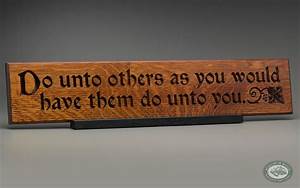The Golden Rule or the Silver Rule?
- Candyce Carden
- Nov 1, 2023
- 3 min read

by Candyce Carden @CandyceCarden
My generation learned it as children. A framed inscription of the words may have hung on the walls of a classroom or in our grandmother’s kitchen.
The Golden Rule is easily one of the most well-known Bible verses. The Scripture was printed in red, and as kids, we knew the red words in the Bible were spoken by Jesus. Important words.
The full version, as presented in Matthew 7:12 NIV, reads:

So in everything, do to others what you would have them do to you, for this sums up the Law and the Prophets.
The Golden Rule is not only known by Christians but is considered a sound principle for living among many groups. But before Jesus spoke these famous words in the sermon on the mount, a lesser-known rule existed. It’s often referred to as The Silver Rule. The two rules are similar, but different.
The Silver Rule
Do not do to others what you would not want them to do to you.
While the golden rule is proactive and calls us to action, the silver rule is passive, containing the negative terms do not and would not. Jesus taught the silver rule does not go far enough. We can’t simply strive to avoid evil; we must also do good.
Jesus illustrates this in “The Parable of the Good Samaritan” (Luke 10:30-38). In the parable, a priest and a Levite crossed to the other side of the road to avoid the bloodied, half-dead man on the ground. The two men followed the silver rule. They didn’t rob or injure the man, after all.
Jesus illustrates this in “The Parable of the Good Samaritan” (Luke 10:30-38). In the parable, a priest and a Levite crossed to the other side of the road to avoid the bloodied, half-dead man on the ground. The two men followed the silver rule. They didn’t rob or injure the man, after all.
The parable continues with the Samaritan walking along the same road. The Samaritan stopped, bound the hurt man’s wounds, and took him to an inn to continue care for him.
Jesus ends the parable with the words, “Go and do likewise.”
The silver rule is about avoiding doing bad, but Jesus calls us to do more. Simply avoiding evil deeds is insufficient. Say you never receive a bill for a service you contracted. The business owner simply overlooked sending the invoice. After waiting a couple of months, what should you do? The silver rule suggests it’s okay to do nothing. It’s not your fault the bill never came. You would pay it if you received it. Do you “accidentally on purpose” forget about it too?
You know the answer. Jesus calls us to live by the golden rule: “Do to others what you would have them do to you.” In everything. Put yourself in the position of the contractor. What would you want your customer to do? I’d want to be paid!
Proponents of the silver rule are at work today. Sociologists and psychologists claim growing numbers of people are living by the silver rule. Reasons cited include the diversity of our communities; isolated lifestyles; and the current element of fear infusing our world.
Jesus does not desire us to live by the silver rule. He instructs us to be active doers rather than passive bystanders. His words call us to action. Let’s allow the Spirit of God to lead us to the good works He created us to do.
Wishing you a November filled with love and gratitude.
Your thoughts and insights are always welcomed. Feel free to leave a comment below or reply by email to this blog post.
